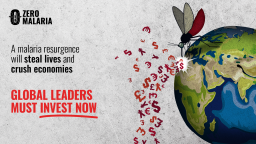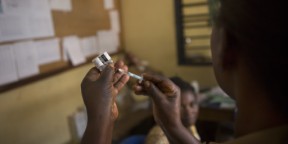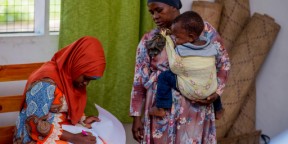Report: How underinvestment in malaria risks resurgence, lost growth, and a generation’s future
Our report, The Price of Retreat: How underinvestment in malaria risks resurgence, lost growth, and a generation’s future, is a warning to global leaders that unless the Global Fund to Fight AIDS, TB and Malaria meets its 8th Replenishment target, the world risks the biggest malaria resurgence on record - costing lives, holding back African economies, and disrupting global trade.
The report, published by the African Leaders Malaria Alliance (ALMA) and Malaria No More UK, focuses on four funding scenarios, from reaching the global target on malaria financing to leaving severe funding gaps, highlighting how crucial the Global Fund’s contribution is in fighting malaria.
The evidence presented is clear - funding malaria is not just a health investment, it fuels growth, protects trade, and secures a stronger, safer and more prosperous world for all. Underfund it and risk triggering the biggest malaria resurgence on record, undermining economic potential and overarching global growth.
2025 is a crucial year for the malaria fight as we enter the 8th Replenishment cycle for the Global Fund to Fight AIDS, TB and Malaria. Efforts to control and eliminate malaria are in jeopardy as communities and programmes face the fallout of recent funding cuts. We are now in a perfect storm for a malaria resurgence, with extreme weather events, rising drug and insecticide resistance, humanitarian crises, and global insecurity. At a time when economic growth across Africa remains fragile, a resurgence of malaria in Africa could have devastating consequences. Two decades of progress are at risk- costing tens of thousands of lives, disrupting businesses and trade, and threatening the livelihoods of millions.
Malaria doesn’t just take lives, it disrupts education, business, and threatens the livelihoods of millions. Yet, malaria is a preventable and treatable disease, we have the knowledge and tools to end it, we just need collective effort and funding to do so.
The Global Fund provides 59% of all international financing for malaria programs, and in countries where the Global Fund invests, malaria deaths have dropped by 29% between 2002 and 2024, helping to support growing economies. Without these interventions, malaria deaths would have increased by 94% over the same period.

This progress proves what is possible with sustained investment: millions of lives saved, economic growth, stronger health systems, and real momentum towards reaching zero malaria in our lifetime.
Our report comes at a pivotal time in global health history. The potential economic realities at stake are clear: invest in malaria and the Global Fund and support African prosperity and global trade. Limit support and a malaria resurgence could hit vulnerable communities hardest and hold back growing economies.





